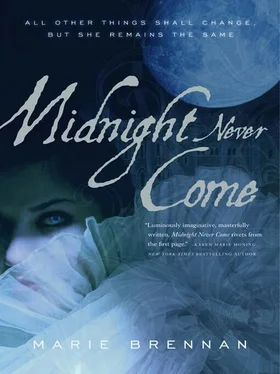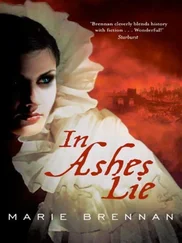From the far end of the hall, a voice boomed out like the crash of waves on rocky shores. “She comes! From the white cliffs of Dover to the stones of the ancient wall, she rules all the fae of England. Make way for the Queen of the Onyx Court!”
The sea of bodies rippled in a sudden ebb tide, every fae present sinking to the floor. The more modest — the more fearful — prostrated themselves on the black-and-white marble, faces averted, eyes tightly shut. Lune listened as heavy steps thudded past, measured and sure, and then behind them the ghostly whisper of skirts. A chill breeze wafted through the room, more imagined than felt.
A moment later, the doors to the presence chamber boomed shut. “By command of your mistress, rise, and attend to her court,” the voice again thundered, and with a shiver the courtiers returned to their feet and faced the throne.
Invidiana might have been a portrait of herself, so still did she sit. The crystal and jet embroidered onto her gown formed bold shapes that complemented those of the throne, with the canopy of estate providing a counterpoint above. Her high collar, edged with diamonds, framed a flawless face that showed no overt expression — but Lune fancied she could read a hint of secret amusement in the cold black eyes.
She hoped so. When Invidiana was not amused, she was often angry.
Lune avoided meeting the gaze of the creature that waited at Invidiana’s side. Dame Halgresta Nellt stood like a pillar of rock, boots widely planted, hands clasped behind her broad back. The weight of her gaze was palpable. No one knew where Invidiana had found Halgresta and her two brothers — somewhere in the North, though some said they had once been fae of the alfar lands across the sea, before facing exile for unknown crimes — but the three giants had fought a pitched combat before Invidiana’s throne for the right to command her personal guard, and Halgresta had won. Not through size or strength, but through viciousness. Lune knew all too well what the giant would like to do to her.
A sinuous fae clad in an emerald-green doublet that fit like a second skin ascended two steps up the dais and bowed to the Queen, then faced the chamber. “Good people,” Valentin Aspell said, his oily voice pitched to carry, “today, we play host to kinsmen who have suffered a tragic loss.”
At the Lord Herald’s words, the doors to the presence chamber swung open. Laying one hand on the sharp, fluted edge of a column, Lune turned, like everyone else, to look.
The fae who entered were a pathetic sight. Muddy and haggard, their simple clothes hanging in rags, they shuffled in with all the terror and awe of rural folk encountering for the first time the cold splendor of the Onyx Hall. The watching courtiers eddied back to let them pass, but there was none of the respect that had immediately opened a path for Invidiana; Lune saw more than a few looks of malicious pity. Behind the strangers walked Halgresta’s brother Sir Prigurd, who shepherded them along with patient determination, nudging them forward until they came to a halt at the foot of the dais. There was a pause. Then a sound rumbled through the hall: a low growl from Halgresta. The peasants jerked and threw themselves to the floor, trembling.
“You kneel before the Queen of the Onyx Court,” Aspell said, with only moderate inaccuracy; two of the strangers were indeed kneeling, instead of lying on the floor. “Tell her, and the gathered dignitaries of her realm, what has befallen you.”
One of the two kneeling fae, a stout hob who looked in danger of losing his cheerful girth, obeyed the order. He had the good sense not to rise.
“Nobble Queen,” he said, “we hev lost ev’ry thing.”
The account that followed was delivered in nearly impenetrable country dialect. Lune soon gave up on understanding every detail; the tenor was clear enough. The hob had served a certain family since time out of mind, but the mortals were recently thrown off their land, and their house burnt to the ground. Nor was he the only one to suffer such misfortune: a nearby marsh had been drained and the entire area, former house and all, given over to a new kind of farming, while a road being laid in to connect some insignificant town to some slightly less insignificant town had resulted in the death of an oak man and the leveling of a minor faerie mound.
When the last of the tale had spilled out, another pause ensued, and then the hob nudged a battered and sorry-looking puck still trembling on the floor at his side. The puck yelped, a sharp and nervous sound, and produced from somewhere a burlap sack.
“Nobble Queen,” the hob said again, “we hev browt yew sum gifts.”
Aspell stepped forward and accepted the sack. One by one, he lifted its contents free and presented them to Invidiana: a rose with ruby petals, a spindle that spun on its own, a cup carved from a giant acorn. Last of all was a small box, which he opened facing the Queen. A rustle shivered across the hall as half the courtiers craned to see, but the contents were hidden.
Whatever they were, they must have satisfied Invidiana. She waved Aspell off with one white hand and spoke for the first time.
“We have heard your tale of loss, and your gifts are pleasing to our eyes. New homes will be found for you, never fear.”
Her cool, unemotional words set off a flurry of bowing and scraping from the country fae; the hob, still on his knees, pressed his face to the floor again and again. Finally Prigurd got them to their feet, and they skittered out of the chamber, looking relieved at both their good fortune and their departure from the Queen’s presence.
Lune pitied them. The poor fools had no doubt given Invidiana every treasure they possessed, and much good would it do them. She could easily guess the means by which those rural improvements had begun; the only true question was what the fae of that area had done to so anger the Queen, that she retaliated with the destruction of their homes.
Or perhaps they were no more than a means to an end.
Invidiana looked out over her courtiers, and spoke again. The faint hint of kindness an optimistic soul might have read into her tone before was gone. “When word reached us of this destruction, we sent our loyal vassal Ifarren Vidar to investigate.” From a conspicuous spot at the foot of the dais, the skeletally thin Vidar smirked. “He uncovered a shameful tale, one our grieving country cousins dreamed not of.”
The measured courtesy of her words was more chilling than rage would have been. Lune shivered, and pressed her back against the sharp edges of the pillar. Sun and Moon, she thought, let it not touch me. She had played no part in these unknown events, but that meant nothing; Invidiana and Vidar were well practiced in the art of fabricating guilt as needed. Had the Queen preserved her from Halgresta Nellt only to lay this trap for her instead?
If so, it was a deeper trap than Lune could perceive. The tale Invidiana laid out was undoubtedly false — some trumped-up story of one fae seeking revenge against another through the destruction of the other fellow’s homeland — but the person it implicated was no one Lune knew well, a minor knight called Sir Tormi Cadogant.
The accused fae did the only thing anyone could, in the circumstances. Had he not been at court, he might have run; it was treason to seek refuge among the fae of France or Scotland or Ireland, but it might also be safety, if he made it that far. But he was present, and so he shoved his way through the crowd and threw himself prostrate before the throne, hands outstretched in supplication.
“Forgive me, your Majesty,” he begged, his voice trembling with very real fear. “I should not have done so. I have trespassed against your royal rights; I confess it. But I did so only out of—”
Читать дальше












